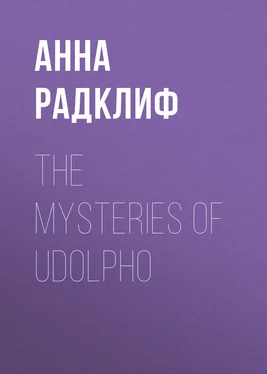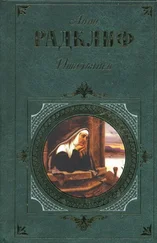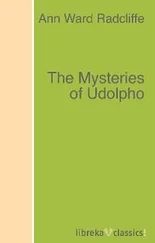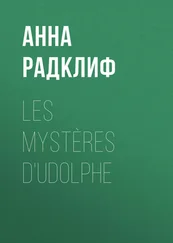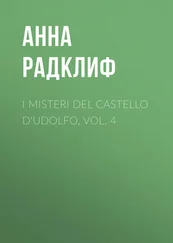Анна Радклиф - The Mysteries of Udolpho
Здесь есть возможность читать онлайн «Анна Радклиф - The Mysteries of Udolpho» — ознакомительный отрывок электронной книги совершенно бесплатно, а после прочтения отрывка купить полную версию. В некоторых случаях можно слушать аудио, скачать через торрент в формате fb2 и присутствует краткое содержание. Жанр: foreign_prose, literature_19, Ужасы и Мистика, foreign_fantasy, foreign_antique, на английском языке. Описание произведения, (предисловие) а так же отзывы посетителей доступны на портале библиотеки ЛибКат.
- Название:The Mysteries of Udolpho
- Автор:
- Жанр:
- Год:неизвестен
- ISBN:нет данных
- Рейтинг книги:5 / 5. Голосов: 1
-
Избранное:Добавить в избранное
- Отзывы:
-
Ваша оценка:
- 100
- 1
- 2
- 3
- 4
- 5
The Mysteries of Udolpho: краткое содержание, описание и аннотация
Предлагаем к чтению аннотацию, описание, краткое содержание или предисловие (зависит от того, что написал сам автор книги «The Mysteries of Udolpho»). Если вы не нашли необходимую информацию о книге — напишите в комментариях, мы постараемся отыскать её.
The Mysteries of Udolpho — читать онлайн ознакомительный отрывок
Ниже представлен текст книги, разбитый по страницам. Система сохранения места последней прочитанной страницы, позволяет с удобством читать онлайн бесплатно книгу «The Mysteries of Udolpho», без необходимости каждый раз заново искать на чём Вы остановились. Поставьте закладку, и сможете в любой момент перейти на страницу, на которой закончили чтение.
Интервал:
Закладка:
Down yonder glade two lovers steal, to shun the fairy-queen,
Who frowns upon their plighted vows, and jealous is of me,
That yester-eve I lighted them, along the dewy green,
To seek the purple flow'r, whose juice from all her spells can
free.
And now, to punish me, she keeps afar her jocund band,
With the merry, merry pipe, and the tabor, and the lute;
If I creep near yonder oak she will wave her fairy wand,
And to me the dance will cease, and the music all be mute.
O! had I but that purple flow'r whose leaves her charms can foil,
And knew like fays to draw the juice, and throw it on the wind,
I'd be her slave no longer, nor the traveller beguile,
And help all faithful lovers, nor fear the fairy kind!
But soon the VAPOUR OF THE WOODS will wander afar,
And the fickle moon will fade, and the stars disappear,
Then, cheerless will they be, tho' they fairies are,
If I, with my pale light, come not near!
Whatever St. Aubert might think of the stanzas, he would not deny his daughter the pleasure of believing that he approved them; and, having given his commendation, he sunk into a reverie, and they walked on in silence.
A faint erroneous rayGlanc'd from th' imperfect surfaces of things,
Flung half an image on the straining eye;
While waving woods, and villages, and streams,
And rocks, and mountain-tops, that long retain
The ascending gleam, are all one swimming scene,
Uncertain if beheld.*
St. Aubert continued silent till he reached the chateau, where his wife had retired to her chamber. The languor and dejection, that had lately oppressed her, and which the exertion called forth by the arrival of her guests had suspended, now returned with increased effect. On the following day, symptoms of fever appeared, and St. Aubert, having sent for medical advice, learned, that her disorder was a fever of the same nature as that, from which he had lately recovered. She had, indeed, taken the infection, during her attendance upon him, and, her constitution being too weak to throw out the disease immediately, it had lurked in her veins, and occasioned the heavy languor of which she had complained. St. Aubert, whose anxiety for his wife overcame every other consideration, detained the physician in his house. He remembered the feelings and the reflections that had called a momentary gloom upon his mind, on the day when he had last visited the fishing-house, in company with Madame St. Aubert, and he now admitted a presentiment, that this illness would be a fatal one. But he effectually concealed this from her, and from his daughter, whom he endeavoured to re-animate with hopes that her constant assiduities would not be unavailing. The physician, when asked by St. Aubert for his opinion of the disorder, replied, that the event of it depended upon circumstances which he could not ascertain. Madame St. Aubert seemed to have formed a more decided one; but her eyes only gave hints of this. She frequently fixed them upon her anxious friends with an expression of pity, and of tenderness, as if she anticipated the sorrow that awaited them, and that seemed to say, it was for their sakes only, for their sufferings, that she regretted life. On the seventh day, the disorder was at its crisis. The physician assumed a graver manner, which she observed, and took occasion, when her family had once quitted the chamber, to tell him, that she perceived her death was approaching. 'Do not attempt to deceive me,' said she, 'I feel that I cannot long survive. I am prepared for the event, I have long, I hope, been preparing for it. Since I have not long to live, do not suffer a mistaken compassion to induce you to flatter my family with false hopes. If you do, their affliction will only be the heavier when it arrives: I will endeavour to teach them resignation by my example.'
The physician was affected; he promised to obey her, and told St. Aubert, somewhat abruptly, that there was nothing to expect. The latter was not philosopher enough to restrain his feelings when he received this information; but a consideration of the increased affliction which the observance of his grief would occasion his wife, enabled him, after some time, to command himself in her presence. Emily was at first overwhelmed with the intelligence; then, deluded by the strength of her wishes, a hope sprung up in her mind that her mother would yet recover, and to this she pertinaciously adhered almost to the last hour.
The progress of this disorder was marked, on the side of Madame St. Aubert, by patient suffering, and subjected wishes. The composure, with which she awaited her death, could be derived only from the retrospect of a life governed, as far as human frailty permits, by a consciousness of being always in the presence of the Deity, and by the hope of a higher world. But her piety could not entirely subdue the grief of parting from those whom she so dearly loved. During these her last hours, she conversed much with St. Aubert and Emily, on the prospect of futurity, and on other religious topics. The resignation she expressed, with the firm hope of meeting in a future world the friends she left in this, and the effort which sometimes appeared to conceal her sorrow at this temporary separation, frequently affected St. Aubert so much as to oblige him to leave the room. Having indulged his tears awhile, he would dry them and return to the chamber with a countenance composed by an endeavour which did but increase his grief.
Never had Emily felt the importance of the lessons, which had taught her to restrain her sensibility, so much as in these moments, and never had she practised them with a triumph so complete. But when the last was over, she sunk at once under the pressure of her sorrow, and then perceived that it was hope, as well as fortitude, which had hitherto supported her. St. Aubert was for a time too devoid of comfort himself to bestow any on his daughter.
CHAPTER II
I could a tale unfold, whose lightest word
Would harrow up thy soul.
Madame St. Aubert was interred in the neighbouring village church; her husband and daughter attended her to the grave, followed by a long train of the peasantry, who were sincere mourners of this excellent woman.
On his return from the funeral, St. Aubert shut himself in his chamber. When he came forth, it was with a serene countenance, though pale in sorrow. He gave orders that his family should attend him. Emily only was absent; who, overcome with the scene she had just witnessed, had retired to her closet to weep alone. St. Aubert followed her thither: he took her hand in silence, while she continued to weep; and it was some moments before he could so far command his voice as to speak. It trembled while he said, 'My Emily, I am going to prayers with my family; you will join us. We must ask support from above. Where else ought we to seek it—where else can we find it?'
Emily checked her tears, and followed her father to the parlour, where, the servants being assembled, St. Aubert read, in a low and solemn voice, the evening service, and added a prayer for the soul of the departed. During this, his voice often faltered, his tears fell upon the book, and at length he paused. But the sublime emotions of pure devotion gradually elevated his views above this world, and finally brought comfort to his heart.
When the service was ended, and the servants were withdrawn, he tenderly kissed Emily, and said, 'I have endeavoured to teach you, from your earliest youth, the duty of self-command; I have pointed out to you the great importance of it through life, not only as it preserves us in the various and dangerous temptations that call us from rectitude and virtue, but as it limits the indulgences which are termed virtuous, yet which, extended beyond a certain boundary, are vicious, for their consequence is evil. All excess is vicious; even that sorrow, which is amiable in its origin, becomes a selfish and unjust passion, if indulged at the expence of our duties—by our duties I mean what we owe to ourselves, as well as to others. The indulgence of excessive grief enervates the mind, and almost incapacitates it for again partaking of those various innocent enjoyments which a benevolent God designed to be the sun-shine of our lives. My dear Emily, recollect and practise the precepts I have so often given you, and which your own experience has so often shewn you to be wise.
Читать дальшеИнтервал:
Закладка:
Похожие книги на «The Mysteries of Udolpho»
Представляем Вашему вниманию похожие книги на «The Mysteries of Udolpho» списком для выбора. Мы отобрали схожую по названию и смыслу литературу в надежде предоставить читателям больше вариантов отыскать новые, интересные, ещё непрочитанные произведения.
Обсуждение, отзывы о книге «The Mysteries of Udolpho» и просто собственные мнения читателей. Оставьте ваши комментарии, напишите, что Вы думаете о произведении, его смысле или главных героях. Укажите что конкретно понравилось, а что нет, и почему Вы так считаете.
